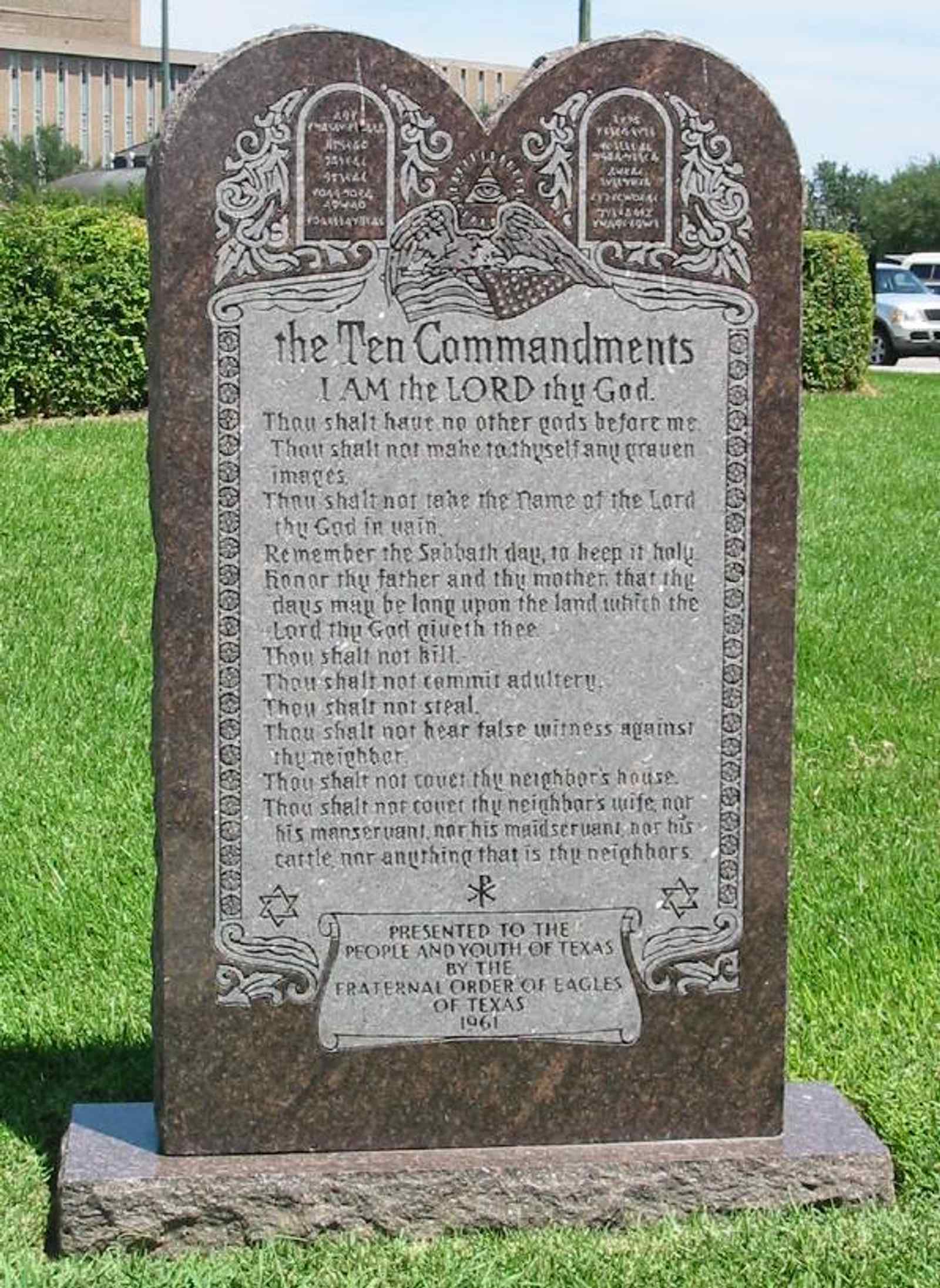The Ten Commandments: A Dialogue for Humanists and Christians
When an Alabama judge wanted to put a stone copy of the Ten Commandments in his courthouse he was asked to name them and could not. It reinforces my belief that we who do not believe in the Bible need to know it in order to have constructive conversations with those professing belief in its inerrancy. Here are a few of my thoughts on the Ten Commandments.
1. I am God and thou shalt have no other Gods before me.
But indeed who is God? Few believe God is some bearded fellow up in the sky. God remains a mystery defined by each individual. Is God indeed a term for the wonder of creation, of our universe (many humanists could agree on this definition). Have no other gods. But what are wealth, possessions, power, prestige, all related to pride if not gods? Pride in my understanding as the premier of the seven deadly sins because we are putting ourselves above God or speaking for him. If we follow the god of the Old Testament, how do we respect those who follow other gods – those who follow the Qu’ran and the Vedas, or who follow no god at all – Buddhists, Confucians, or atheists – who want an ethical, just society as well?
2. Thou shalt not make any graven image.
What is a graven image and why did Aaron choose a golden calf? Was it the gold -- in which case we are still struggling (just look at the wealth on display in many churches). Or does this speak out against worshiping the wonders of creation in the heavens, earth. Religion has inspired man over the ages to make wonderful statues, and paintings, music and hymns. Are these graven? Even as a secular person, I feel it’s a shame to lose the millennia of religious-inspired art.
3. Do not take the Lords name in vain.
We think of this as referring to avoiding “God Damn you.” But perhaps it’s more about using God to justify earning one hundred times what most people earn or using up more of the earth’s resources than it can stand. Maybe it’s about praying for victory in sports, business or international events when we should be praying for help making righteous decisions and to “love one another.” These are values where humanists and Christians can find common ground.
4. Honor the Sabbath to Keep it Holy.
This commandment is pretty much ignored in modern society or made ridiculous in some very restrictive practices. But many secular and religious people could agree that stopping our materialistic rush and just taking time to appreciate what we have been given is good for us all.
5. Honor Thy Father and Mother.
This at least we continue to pay some respect to even if we struggle with defining our father and mother: does it apply to our birth parents, those who raised and cared for us, the earth itself, our teachers and mentors, past generations? We honor them if we think of them, respect them and learn from what they did and repeat the sacrifices they made for us. What if our birth parents abandoned us or are addicts or racists, etc.? How we show such parents respect while maintaining boundaries and self-respect is a question everyone can benefit from exploring.
6. Thou shalt not kill.
We can all agree that outright murder is evil. But what about those who oppress and abuse the poor, the economically disadvantaged and prevent widespread access to healthcare, all of which lead to death indirectly. Can Christians and atheists agree that these kinds of behavior violate the sixth commandment?
7. Thou shalt not commit adultery.
Fornication is not even mentioned and therefore not a sin (at least according to the Ten Commandments). Why, therefore, can we not teach our youth the concept of responsible, safe sex? What about Abraham with Sarah and Hagar or Jacob with Rachel, Leah, Bilhah and Zilpah? Why then is heterosexual monogamous marriage so stressed by fundamental Christians as the only way forward?
8. Thou shalt not steal.
We can all agree on outright theft, but what of dishonest banks and investment managers including of course insider trading and money earned by information gained by being in government or in a position of power? Is this theft, and should Christians who follow the Ten Commandments be morally obligated to put an end to practices like these?
9. Thou shalt not bear false witness
This means lying We can all agree on outright lies, but can we also agree that we should all be careful about distorting and manipulating facts? Should someone who follows the Ten Commandments fight for complete honesty in corporate America, the government and the media?
10. Thou shalt not covet
Our whole commercial world is built upon but coveting more , better, and bigger (salary, office, house, car, clothes, entertainment, spouses). This I believe exemplifies the most prevalent sin in our society. Can humanists and Christians come together to work for a less covetous society?
The Ten Commandments do in fact offer food for thought. If we humanists at Oasis study it and discuss with Christians and Jews who devoutly believe in its precepts, we might find we have common ground, or at the very least, can have important conversations about where we differ.

